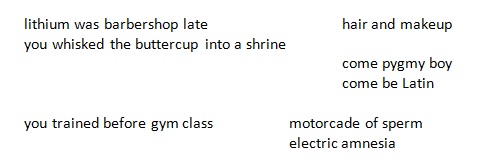‘Close to Home’ by Michael Crowley
-Reviewed by Billy Mills–
Close to Home is the debut poetry collection of playwright and youth justice worker Michael Crowley. It is a pamphlet in three sections: the first, titled South Oxhey centres around the poet’s childhood home; the second, Her Majesty’s Young Offenders Institution does what it says on the tin; Landlocked, the third section, is less explicitly thematic and opens out the focus of the work to a broader palette of concerns.
South Oxhey is a council-built housing estate on the edge of Watford that was originally designed to house Londoners who were displaced in the post-war era by a combination of Blitz damage and generally poor housing conditions in the capital. It’s the kind of area that would, on the surface, lend itself to misery-memoir writing, but this is not the approach Crowley takes. His poems in this section have a documentary quality that helps prevent them from tipping over into self-pity. There is an awareness of the otherness of those who live on ‘the other side’:
‘Over there they dressed for work,
had bigger windows, cleaner tongues,
porches and mortgages,
their children waited to be asked,
stayed indoors on their own side.’
However, this sense of difference does not imply any kind of inferiority. Crowley’s memories are, for the most part, celebratory. He clearly relishes the proximity of nature,
‘the hour and a half of copse and grass,
the dell deep enough to abseil down’
And his house was full of books, Edna O’Brien and Brendan Behan are mentioned, and political discussion, especially against the backdrop of the 1974 miner’s strike and three-day week. But most of all it is the language that allows Crowley to avoid sentimentality. Clear, clean, matter-of-fact, these poems are quietly insistent that we take them at face value, as a true narrative of a life. Indeed, the very occasional lapses into the poetic, such as when an asphalt road is described as ‘like liquorice’, jar more than they would if the general control wasn’t as good as it is.
The documentary tone of the writing carries over into the second section, but the focus moves from the self to others, from memoir to biography. The stories of these young men caught up in the prison system are allowed to speak for themselves with a minimum of authorial direction. One, an Afghani, is sustained by memories of home, when
‘his father showed him
how to drink meat from a sheep
straight from its bloated teat,
oil his Russian rifle with mutton grease’
Another’s memories are, perhaps, less sustaining:
‘Here he comes with it,
breathing it, wearing it
behind a rendered face,
inside a measured walk.
He has it and he wants to keep it
close. The killing of a man.’
Whatever their backgrounds, these young men’s stories are treated with an even-handed, non-judgemental sense of perspective, and despite the poet’s investment in the power of creative writing in their rehabilitation, as evidenced in his book Behind the Lines: Creative Writing with Offenders and People at Risk, he does not shirk from including the less sanguine view of the prison staff in a poem called ‘It’s a Job’:
‘Do you think those two
who saved up their faeces and urine
in a bucket under the bed
to throw in an officer’s face
can be changed through a drama group?’
Indeed, it is typical of these poems that the problematic nature of the subject is not skirted around in any way. Some of the stories told are frankly horrific, but the poet refuses to either trivialise or sensationalise them.
The poems in the Landlocked section are less overtly linked than those in the previous sections. The narrative perspective returns to the first person, but now it’s an adult ‘I’ and the memories are both closer to hand and more problematic than those of the opening section. These poems are saturated with a sense of loss, rupture and death. The first stanza of ‘Cut Down’ lends one sense to the title:
‘Muriel’s garden got too much,
undergrowth overgrew.
Determined weeds tugged her to her knees,
dandelions got the upper hand.
She gave it up, gave it to us
the day before we got the news.’
The closing lines bring another meaning to bear:
‘Muriel heard about you on the news.
She offered to take the garden back –
I told her no.’
In ‘The Ghost House’, a home rented after the deaths of the previous occupants presides over the slow demise of a relationship until ‘It coughed us out’. A number of other poems, including the one that gives its name to the section, reference ‘the Peninsula’, and this sense of being landlocked in a place that is sea-locked is the clearest expression of the irony at the heart of these poems; the ‘I’ may be locked in, but what it is locked in to is a natural world that shapes our ways of being and nourishes like
‘September heavy sloes,
ready to be swallowed
onto a belly of mud.’
This is an interesting, if sometimes uneven, collection. Despite the occasional lapse into the ‘poetic’, the cool, factual tone and dispassionate handling of what is often extremely personal or controversial matter ensures that the twin pitfalls of sentimentality and propaganda are carefully avoided. It’s a pamphlet of assured maturity and quiet strength and while it might not set your poetic world alight, it will certainly give you much food for thought.




Pingback: Another Announcement: Another Review | Elliptical Movements